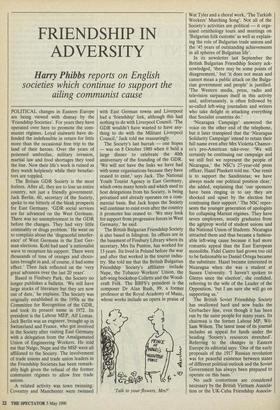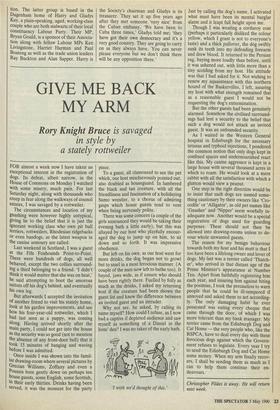FRIENDSHIP IN ADVERSITY
Harry Phibbs reports on English
societies which continue to support the ailing communist cause
POLITICAL changes in Eastern Europe are being viewed with dismay by the 'Friendship Societies'. For years they have operated over here to promote the com- munist regimes. Loyal stalwarts have de- fended the indefensible in return for little more than the occasional free trip to the land of their heroes. Over the years of poisoned umbrellas, military invasion, martial law and food shortages they toed the line. Now their life's work is ruined as they watch helplessly while their benefac- tors are toppled.
The Britain GDR Society is the most forlorn. After all, they are to lose an entire country, not just a friendly government. Jack Berlin, 60, secretary of the Society, spoke to me bitterly of the bleak prospects for East Germany. 'GDR social services are far advanced on the West Germans. There was no unemployment in the GDR before the changes. They had very little criminality or drugs problem.' He went on to complain about the 'disgraceful interfer- ence' of West Germans in the East Ger- man elections. Kohl had used 'a nationalist wave to recapture his support. There were thousands of tons of oranges and choco- lates brought in and, of course, it had some effect.' Then Jack reflected on the 'very great advances over the last 20 years'.
Based in Finsbury Park, the Society no longer publishes a bulletin. 'We still have large stocks of literature but they are now out of date,' he explains. The Society was originally established in the 1950s as the Committee for Recognition of the GDR, and took its present name in 1972. Its president is the Labour MEP, Alf Lomas. Jack Berlin was an engineer, brought up in Switzerland and France, who got involved in the Society after visiting East Germany with a delegation from the Amalgamated Union of Engineering Workers. He told me that Nalgo, Nupe and the MSF were all affiliated to the Society. The involvement of trade unions and trade union leaders in the Friendship Societies has been remark- ably high given the refusal of the former communist regimes to allow free trade unions.
A related activity was town twinning: Coventry and Manchester were twinned with East German towns and Liverpool had a 'friendship' link, although this had nothing to do with Liverpool Council. 'The GDR wouldn't have wanted to have any- thing to do with the Militant Liverpool Council,' Jack told me reassuringly.
The Society's last hurrah — one hopes — was on 8 October 1989 when it held a large dinner to celebrate the 40th anniversary of the founding of the GDR. 'We will not have the links we have had with some organisations because they have ceased to exist,' says Jack. The National Youth Tourist Agency in East Germany, which owns many hotels and which used to host delegations from his Society, is being privatised and already operates on a com- mercial basis. But Jack hopes the Society will continue to exist even after the country it promotes has ceased to. 'We may look for support from progressive forces in West Germany,' he said. The British Bulgarian Friendship Society is also based in Islington. Its offices are in the basement of Finsbury Library where its secretary, Mrs Ita Punton, has worked for 13 years. Ita lived in Poland before the war and after that worked in the tourist indus- try. She told me that the British Bulgarian Friendship Society's affiliates include Nupe, the Tobacco Workers' Union, the left-wing bookshop Colletts and the Wood- craft Folk. The BBFS's president is the composer Dr Alan Bush, 89, a former professor at the Royal Academy of Music, whose works include an opera in praise of
'Talk to your flowers, Mrs?'
Wat Tyler and a choral work, The Turkish Workers' Marching Song'. Not all of the Society's activities are political — it orga- nised ornithology tours and meetings on 'Bulgarian folk customs' as well as explain- ing the role of Bulgarian trade unions and the '45 years of outstanding achievements in all spheres of Bulgarian life'.
In its newsletter last September the British Bulgarian Friendship Society ack- nowledged, 'there may be some points of disagreement,' but 'it does not mean and cannot mean a public attack on the Bulga- rian government and people' is justified. 'The Western media, press, radio and television surpasses itself in this activity and, unfortunately, is often followed by so-called left-wing journalists and writers who take delight in attacking everything that Socialist countries do.'
'Nicaragua Campaign' answered the voice on the other end of the telephone, but it later transpired that the 'Nicaragua Solidarity Campaign' intend to retain their full name even after Mrs Violetta Chamor- ro's pro-American take-over. 'We will certainly be continuing our campaign and we still feel we represent the people of Nicaragua,' the NSC's 27-year-old press officer, Hazel Plunkett told me. 'Our remit is to support the Sandinistas; we have always made our political position clear,' she added, explaining that 'our sponsors have been ringing in to say they are shocked and upset by the election but continuing their support.' The NSC repre- sents the younger generation of apologists for collapsing Marxist regimes. They have seven employees, mostly graduates from the agitprop world of student unions and the National Union of Students. Nicaragua attracted them and thus became a fashion- able left-wing cause because it had more romantic appeal than the East European monoliths. Fidel Castro had grown too old to be fashionable so Daniel Ortega became the substitute. Hazel became interested in Nicaragua when she was a student at Sussex University. 'I haven't spoken to Glenys since the election', she confided, referring to the wife of the Leader of the Opposition, 'but I am sure she will go on supporting us.'
The British Soviet Friendship Society has swallowed hard and now backs the Gorbachev line, even though it has been run by the same people for many years. Its chairman is the former Labour MP, Wil- liam Wilson. The latest issue of its journal includes an appeal for funds under the heading 'Society's resources stretched'. Referring to the changes in Eastern Europe its editorial says: 'One of the early proposals of the 1917 Russian revolution was for peaceful existence between states of different political outlook and the Soviet Government has always been prepared to operate on this basis.'
No such contortions are considered necessary by the British Vietnam Associa- tion or the UK-Cuba Friendship Associa- tion. The latter group is based in the Dagenham home of Harry and Gladys Kay, a plain-speaking, aged, working-class couple who are both stalwarts of their local constituency Labour Party. Their MP, Bryan Gould, is a sponsor of their Associa- tion along with fellow Labour MPs Ken Livingstone, Harriet Harman and Paul Boateng as well as the trade union leaders Ray Buckton and Alan Sapper. Harry is the Society's chairman and Gladys is its treasurer. They set it up five years ago after they met someone 'very nice' from the Cuban embassy. 'We have been to Cuba three times,' Gladys told me; 'they have got their own democracy and it's a very good country. They are going to carry on as they always have. You can never please everyone but we don't think there will be any opposition there.'



















































 Previous page
Previous page